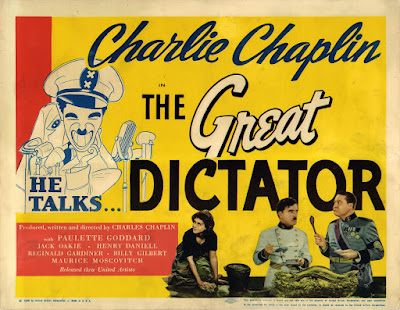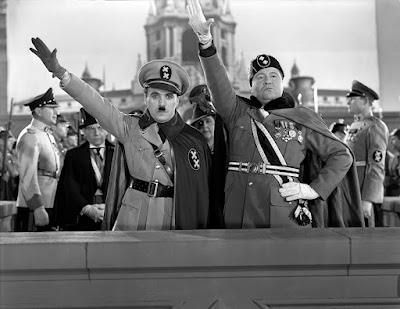 'The Criterion Collection' have recently released a digitally enhanced version of the comedy classic, 'The Great Dictator'. It was directed by Charles Chaplin; it starred Charles Chaplin, Paulette Goddard, Jack Oakie, and Billy Gilbert; and it lasts for 125-minutes. Plus, as an extra added bonus, the Blu-ray edition comes with a rerelease trailer, two visual essays, extracts from two silent films, some behind-the-scenes footage, a documentary that compares Chaplin's life with Hitler's life, as well as audio commentary narrated by Dan Kamin and Hooman Mehran. Please enjoy.
'The Criterion Collection' have recently released a digitally enhanced version of the comedy classic, 'The Great Dictator'. It was directed by Charles Chaplin; it starred Charles Chaplin, Paulette Goddard, Jack Oakie, and Billy Gilbert; and it lasts for 125-minutes. Plus, as an extra added bonus, the Blu-ray edition comes with a rerelease trailer, two visual essays, extracts from two silent films, some behind-the-scenes footage, a documentary that compares Chaplin's life with Hitler's life, as well as audio commentary narrated by Dan Kamin and Hooman Mehran. Please enjoy.The Great Dictator (The Criterion Collection)
THE STORY:
For many years, I've been confined to a hospital bed because I sustained a rather bad injury during the war. But now I'm back, back on my feet again and well enough to live a normal life, I find out that the world around me has drastically changed. Changed for the worse, on account of a dictator named Hynkel (Charles Chaplin) who's chosen to persecute all of the Jewish people living in our imperfect nation.
So, what can I do to stop this? Stop this obvious injustice! As I want to help, I sincerely do, but I don't think I can because I'm nothing more than a humble barber from the ghetto (Chaplin again) who can barely earn a living. Heck, I needed help myself when a group of Hynkel's storm troopers decided to attack me!
The first time this happened I was trying to defend my business from two of these storm troopers, when lo and behold, a lovely lady called Hannah (Paulette Goddard) jumped in and bashed them both on the head. Then sometime later, I was helped again, but this time by an old friend I met during the war, Schultz (Reginald Gardiner), who prevented them from taking me away as he's now a part of Hynkel's army.
Although, that's most probably why what next transpires goes from here to there when another war is suddenly declared. As an imperfect nation gets sucked by a leach - a family of Jews avoids going to the beach - two dictators should drink a lot more bleach - and at the end of the day, please remember, a humble barber can sometimes deliver a really great speech.
THE REVIEW:
Upon its release, Adolf Hitler banned 'The Great Dictator' from being shown in Germany and Francisco Franco banned it from being shown in Spain. But why? Why did they decide to stop their citizens from watching this comedy classic? Was it because they disliked some of the actors involved? (🤔) Or was it because they objected to the storyline it was trying to convey? (😷) Well, between you and me, I think it's because these two politicians were bloody idiots, plain and simple, as it's a marvelous movie full of fun, excitement, and pathos.
In many ways, it's the type of movie that's able to express a political message that I'm sure most people can agree with. Nowadays, anyway, partly due to its simplistic subject matter (war is bad) and partly due to its basic intent (it's nice to be nice). But more importantly, it's also a very funny film, one that utilized a variety of different comedic styles, ranging from visual, slapstick humor, all the way to jovial, verbal gags, all the while, maintaining a fairly episodic narrative that can easily be divided into four distinct parts.
The first part of the story acted as a prologue of sorts, as it established the main character (the barber, played by Chaplin) as well as the world he was about to embrace (ouch!). The second part then introduced us to a handful of supporting characters (such as Hannah, for instance, played by Paulette Goddard), along with the big bad villain who opposed them (Hynkel, again, played by Chaplin). And finally, the third and fourth parts of the story swiftly exacerbated the predicament they all faced (slap!) and eventually declared who should come out on top. Or should I say, who had the final word? Hint-hint!
In terms of a visual style, however, I initially thought that 'The Great Dictator' didn't have one as everything on the screen looked and flowed in a fairly conventional manner. But after a while, I began to realize that its visual style didn't derive from oblique camera angles or cleverly staged lighting, instead, it derived from the over-exaggeration of certain props, backgrounds, and clothing. This included things like the large cannon featured at the start of this film (named, the 'Big Bertha'), the lavish look of Hynkel's grand headquarters (very regal), as well as the bold and cartoonish costumes worn by the storm troopers (both intimidating and silly). Similarly, the music played throughout this film also appeared to be larger than life. Acoustically, at least, although, in this case, either by overemphasizing the stupidity of certain situations (prancing on the street after being hit on the head) or by subtly caressing others (playfully dancing with a globe) in order to enhance what each scene wanted to convey.
Anyway, that's enough of that for the time being, because now seems like a pretty good time for us to sit back, relax, and check out the following filmic facts: (1) 'United Artists' first released this $2 million production in New York City, USA, on the 15th of October, 1940, and eventually clawed back $5 million at the box office. (2) Originally, Chaplin planned to call this film, 'The Dictator', but added the word 'Great' to it because 'Paramount Pictures' owned the rights to an unrelated novel with the same name and wanted to charge him $25,000 for its use [the title, not the novel]. (3) This was Chaplin's first all-talking picture, even though the silent era ended approximately 10 to 13 years before its release. (4) In an early version of the script, Chaplin's character was going to be a paperhanger, not a barber, but for some unknown reason, he chose to change it. (5) This movie was shot inside 'Chaplin Studios', located at 1416 N. La Brea Avenue, Hollywood, Los Angeles, as well as on location throughout the American state of California. This includes Lake Vista Drive in the Agoura Hills, 'Reuss Ranch' near Malibu Lake, Holly Street and 'City Hall' in Pasadena, as well as Laurel Canyon, the Hollywood Hills, the San Fernando Valley, the Santa Monica Mountains, and Mulholland Highway in Los Angeles. (6) Jack Oakie once told a reporter that he 'made hundreds of pictures', but he's only remembered for playing Napaloni in this film. (7) In 1947, Chaplin paid Konrad Bercovici $95,000 because Konrad claimed that Chaplin based this film on a script he had given him. In return for this sum of money, Konrad acknowledged Chaplin as the sole author of this film and granted him exclusive rights to the screenplay [as well as first option on two of his own stories].
In closing my review of 'The Great Dictator', I'm going to avoid commenting on any of the performances featured in this film because I can't say anything new about its great cast of actors other people haven't said already. After all, their place in film history has been firmly cemented by this classic slice of cinema, either for their stoic style (Reginald Gardiner), their wholesome beauty (Paulette Goddard), their sinister nature (Henry Daniell), or their cartoonish tomfoolery (Jack Oakie and Billy Gilbert). So, no matter what I say, either good or bad, time has proven that they've all given very memorable performances, even though in hindsight, they were occasionally rather too overt.
Now don't worry, folks, as I haven't forgotten to mention the star of this show... Charles Chaplin. Or as I like to call him, the man with the plan. The plan that managed to redefine cinema by going against convention and making a statement that not many people wanted him to make. Well, did you know that before and after this film was released, a number of people objected to it because World War II was in full swing and certain parties didn't want their countries to get involved? Such as the American columnist, Ed Sullivan, for instance, who claimed that the speech at the end of this film was pure Communist propaganda, as well as the heads of several film studios for fear that it would affect their international sales.
But did Chaplin care about any of this? No, of course not, as at that precise moment in time he had the skill, the focus, and the perseverance to make his statement and then left it up to the public to decide if they wanted to hear it. Which they did, eventually, as 'The Great Dictator' was a success at the box office (see the stats above for more details) and the bans in Germany, Spain, and other countries were ultimately lifted (1958, for Germany, and 1976, for Spain), all because of what he wanted to say...
Later in his life, Chaplin said that he wouldn't have made this film if he knew about all of the atrocities committed during World War II. But in a strange way, we all now know more about these atrocities due to his ignorance, which in itself, says more about how people perceive information when it's presented to them in a humble and entertaining manner. Nuff said.
THE RATING: A
THE GREAT DICTATOR (1940)
 Reviewed by David Andrews
on
September 26, 2022
Rating:
Reviewed by David Andrews
on
September 26, 2022
Rating:
 Reviewed by David Andrews
on
September 26, 2022
Rating:
Reviewed by David Andrews
on
September 26, 2022
Rating:








No comments:
Post a Comment